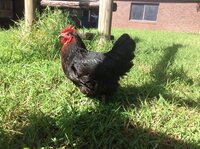GypsyVanner
Chirping
- Aug 15, 2019
- 7
- 17
- 51
Hi, I have a 9yr old Australorp hen and noticed when I went to lock her up tonight that her head is slightly tilted to the side. She seems to be able to balance ok (though not well) at this stage and was still able to eat.
From my research she may have wry neck. Nothing has changed in terms of her routine or diet so I am unsure of the cause. She is my only chicken at the moment.
I had a look through old threads on this site and it seems like the treatment usually involves vitamin e & b and selenium supplements as well as hand feeding/watering if necessary. Is this correct? Should I also put her on antibiotics?
In terms of the vitamin supplements, how do you administer them to a chicken? Are there poultry-specific supplements or are human ones ok to use?
In terms of selenium the suggestions I have seen were to feed scrambled egg, how often would you do this and how much would you give (she is significantly smaller than a standard Australorp hen, more like the size of an Isa Brown)?
Also, if syringing water is required how much would be appropriate and how often?
It's currently midnight here so I won't be able to do much until the morning, but any advice is appreciated. I have had this hen since she was hatched, so I really hope I will be able to help her recover from this. Thanks in advance.
From my research she may have wry neck. Nothing has changed in terms of her routine or diet so I am unsure of the cause. She is my only chicken at the moment.
I had a look through old threads on this site and it seems like the treatment usually involves vitamin e & b and selenium supplements as well as hand feeding/watering if necessary. Is this correct? Should I also put her on antibiotics?
In terms of the vitamin supplements, how do you administer them to a chicken? Are there poultry-specific supplements or are human ones ok to use?
In terms of selenium the suggestions I have seen were to feed scrambled egg, how often would you do this and how much would you give (she is significantly smaller than a standard Australorp hen, more like the size of an Isa Brown)?
Also, if syringing water is required how much would be appropriate and how often?
It's currently midnight here so I won't be able to do much until the morning, but any advice is appreciated. I have had this hen since she was hatched, so I really hope I will be able to help her recover from this. Thanks in advance.





